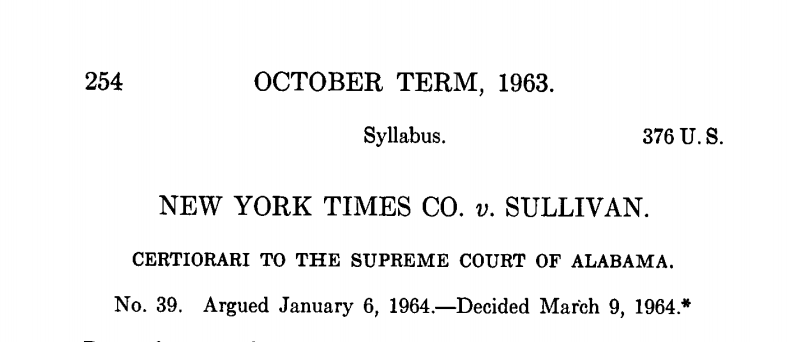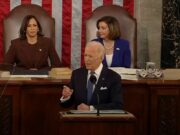Over the past few months, President Trump’s reelection campaign has sued four different media organizations for defamation. In response to free speech advocates’ concerns that such legal action would chill constitutionally protected speech critical of the president, the campaign’s Senior Legal Advisor Jenna Ellis said, “False statements are not protected under the U.S. Constitution.”
Ironically, this statement is false.
Many false statements are protected by the First Amendment, for good reason. In the landmark 1964 case New York Times v. Sullivan, the Supreme Court recognized “[t]hat erroneous statement is inevitable in free debate, and that it must be protected if the freedoms of expression are to have the ‘breathing space’ that they ‘need . . . to survive.’” Even more directly, a 2012 opinion noted that “[t]he Court has never endorsed the categorical rule . . . that false statements receive no First Amendment protection.”
While defamation is one of the few categories of unprotected speech, the Supreme Court has set very high standards for imposing defamation liability in the context of political speech. In Sullivan, the Court determined that an ad placed by civil rights advocates in The New York Times did in fact contain falsehoods. Yet it held that, in defamation suits brought by public officials, “[f]actual error, content defamatory of official reputation, or both, are insufficient to warrant an award of damages for false statements…” In order to win a defamation suit, a public official must not only prove the statement to be false, but also that the defendant knew it was false or recklessly disregarded the truth. These standards were later applied more broadly to “public figures.”
The Trump campaign’s first three lawsuits – against The New York Times, The Washington Post, and CNN – allege the news outlets published opinion pieces with false statements about the president’s campaign. The campaign is a public figure under the law. It’s also controlled by the most powerful public official in the country (who told reporters after the first lawsuit that “there will be more coming”). And the allegedly defamatory speech in question is clearly critical of the president’s conduct, not just the campaign organization itself. Furthermore, all of the articles were published as opinions, not factual reporting. Given these circumstances, courts are very unlikely to punish the media outlets for publishing the statements targeted by the lawsuits.
Most recently, the campaign sued a local TV station in Wisconsin for broadcasting a super PAC’s allegedly “false and defamatory” ad. The lawsuit claims the ad is deceptively edited to portray Trump calling the coronavirus a “hoax” and that the full context of Trump’s speech shows he was not referring directly to the virus when he used that word. The ad doesn’t even mention the Trump campaign. So the campaign is essentially suing for defamation on behalf of the president.
Referring to the cease-and-desist letter the campaign sent prior to suing, Ellis said, “We fully expected the station would recognize their error and immediately cease under their FCC obligations. The Trump campaign is now left with no other option than to use the force of law to ensure these false and defamatory ads cease.”
It’s unclear what “FCC obligations” she’s referencing. The FTC enforces truth in advertising laws meant to protect against fraudulent commercial advertising, but those don’t apply to political ads. Interestingly, if the ad was from a candidate’s campaign instead of an independent group, the station’s FCC obligations would have required it to broadcast the ad, and the Trump campaign would not be able to sue the station.
Under Sullivan and the First Amendment’s strong protections for political speech, this lawsuit also has little chance of success. But as media law professor and Columbia Journalism Review press freedom correspondent Jonathan Peters told The Hill, “The concern here is not that one of these suits would win on the merits – it’s the chilling effect that it has on public discussion of political affairs.”
Lawmakers should keep in mind that any effort to use the force of law to inflict punishment for allegedly false political speech will have this same chilling effect.
In fact, the mere threat of legislation (along with a relentless pressure campaign) from Congress has already chilled political speech online. Shortly after Rep. David Cicilline announced he was working on legislation to impose liability on social media companies for false statements in political ads that appear on their platforms, Twitter announced it would no longer allow any political ads on its services. Rep. Jan Schakowsky is also interested in legislation to address her concerns “about how far one can go in paid political advertising where Facebook will take no responsibility for anything that is said in a paid political ad.”
Cicilline insists that “[r]ather than being a First Amendment issue, it’s really a kind of revenue generation issue for a business.”
Importantly, in Sullivan, the Supreme Court held that “[e]xpression does not lose constitutional protection to which it would otherwise be entitled because it appears in the form of a paid advertisement.”
Cicilline, perhaps aware of the serious constitutional issues in his original idea, has apparently now settled on “Protecting Democracy from Disinformation” by forcing online platforms to limit the ability of political advertisers to “microtarget” their messages. The proposal would also force platforms to report detailed information about individual ads and advertisers. The imposition of liability in the proposal would likely cause more platforms to follow Twitter’s lead in banning all political ads.
Following Twitter’s decision, Rep. Alexandria Ocasio-Cortez said “that if a company cannot or does not wish to run basic fact-checking on paid political advertising, then they should not run paid political ads at all.” She added that she’s “a candidate that runs digital ads & believe[s] they can be productive + useful *IF* used responsibly.” The problem, of course, is that once companies decide not to allow any political ads, no one can “responsibly” utilize this “productive + useful” form of speech on that platform. Upstart candidates, like Ocasio-Cortez once was, often rely on cost-effective online ads to get their messages out and spread awareness of their campaigns. The ability to microtarget is a significant reason why online advertising is “productive + useful” at much lower costs than other forms of advertising.
In October, just about every Democratic member of the House of Representatives voted for a bill imposing criminal penalties for distributing “deceptive audio or visual media of [a] candidate” that “would cause a reasonable person to have a fundamentally different understanding or impression… than that person would have if the person were hearing or seeing the unaltered, original version of the image or audio or video recording.” This is precisely the Trump campaign’s complaint in its latest defamation lawsuit. If the fear of civil action chills political speech, then surely the fear of being “imprisoned not more than 5 years,” as the House-passed bill mandates, would have the same, if not greater, chilling effect.
Determining whether political statements or ads are false or deceptive is often quite, well, political. This should be obvious to both the Trump campaign and Democrats in Congress, especially in light of the near constant controversies over “fact-checking” on social media.
Different perspectives often lead to different conclusions about what is true, especially in the realm of political debate. This is one reason courts are loath to weigh in on such determinations and have prevented the government from serving as the arbiter of political truth.
Explaining its decision to apply First Amendment protections to even demonstrably false political statements, the Supreme Court in Sullivan highlighted our “profound national commitment to the principle that debate on public issues should be uninhibited, robust, and wide-open, and that it may well include vehement, caustic, and sometimes unpleasantly sharp attacks on government and public officials.”
Politicians’ attempts at micromanaging political debate, whether through lawsuits or legislation, serve only to limit discussion about who holds power, who should hold power, and how that power should be wielded. If freedom of speech is to mean anything, it must include the freedom to determine for ourselves the veracity of the most contentious political statements of the day.














